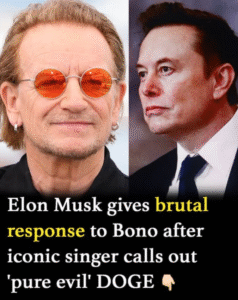In a recent podcast appearance, U2 frontman Bono launched a scathing critique of Elon Musk’s role in the Department of Government Efficiency (DOGE), attributing severe humanitarian consequences to the agency’s aggressive budget cuts. Bono cited a study estimating over 300,000 deaths linked to these cuts, particularly highlighting the dismantling of USAID and its impact on global food distribution efforts. He condemned the abrupt firing of essential personnel, arguing that such measures reflect a lack of compassion and undermine America’s moral leadership.
In response, Musk defended DOGE’s initiatives, emphasizing the necessity of reducing government waste to prevent national bankruptcy. He acknowledged the possibility of mistakes but maintained that the overall goal was to enhance efficiency without compromising critical services. Musk also highlighted that DOGE had already achieved significant savings and aimed to continue its mission beyond his tenure.
The exchange underscores the contentious nature of DOGE’s cost-cutting measures, with critics pointing to the detri mental effects on humanitarian programs and supporters arguing for fiscal responsibility. As Musk steps down from his official role, the debate over the balance between efficiency and compassion in government spending continues.
mental effects on humanitarian programs and supporters arguing for fiscal responsibility. As Musk steps down from his official role, the debate over the balance between efficiency and compassion in government spending continues.
